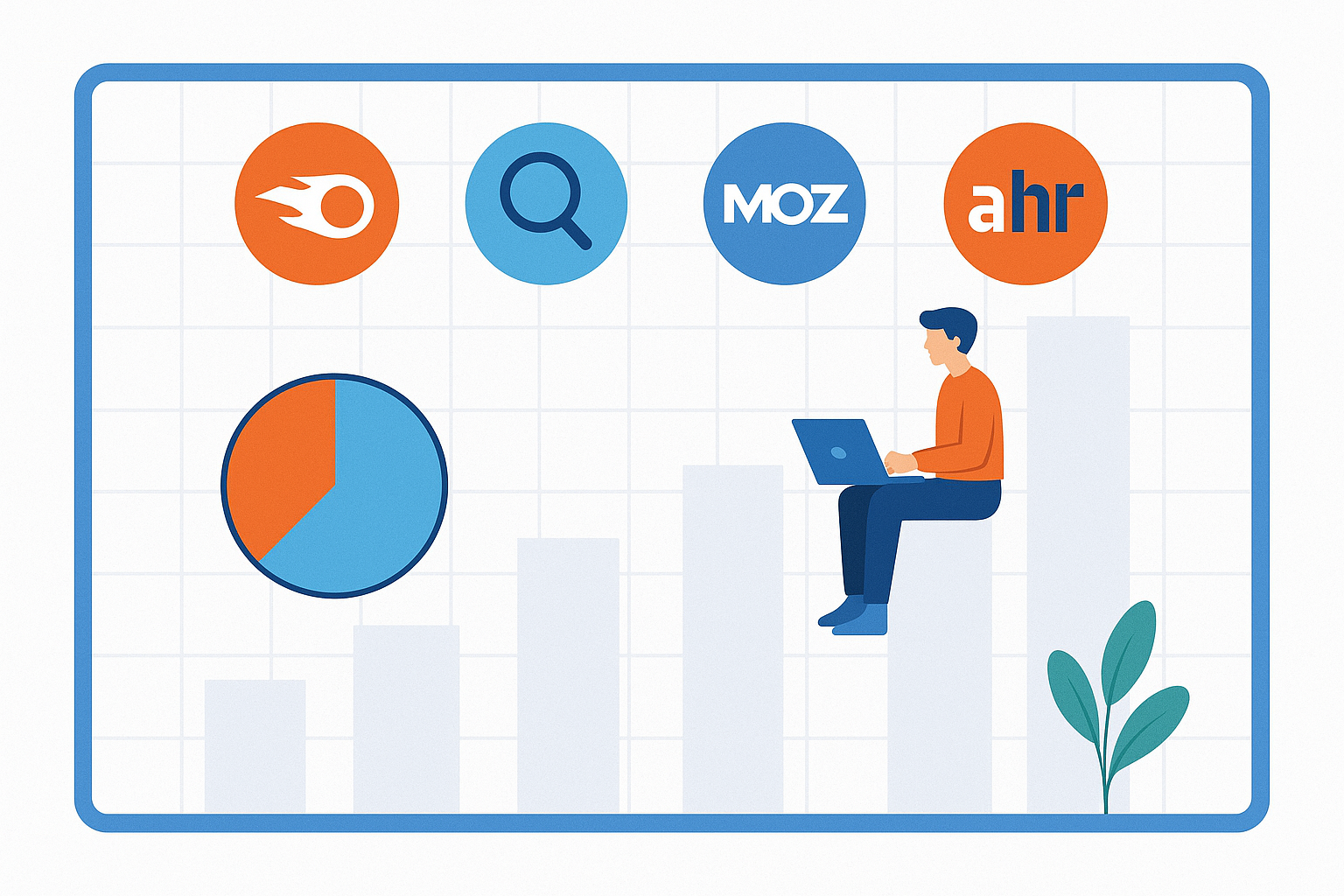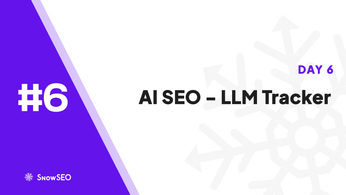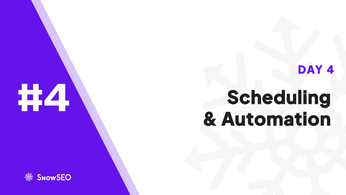
Top 7 All-in-One SEO Platforms Reviewed
Table of Contents
In the evolving world of SEO, choosing the right all-in-one platform can make or break your strategy. With numerous options available, selecting a platform that truly meets your needs is overwhelming. This review covers the top 7 platforms integrating the latest 2025 innovations. Leveraging expert analysis and real-world case studies, we aim to guide you through the best choices for your SEO endeavors.
All-in-one SEO platforms are comprehensive tools designed to streamline and enhance various aspects of search engine optimization. These platforms integrate multiple functionalities, such as keyword research, backlink analysis, site audits, and performance tracking, into a single interface. By consolidating these features, they enable users to manage and optimize their websites more efficiently, reducing the need to juggle multiple disparate tools.
What Makes a Platform All-in-One?
An all-in-one SEO platform typically encompasses several key components:
- Keyword Research: Identifying relevant keywords to target for content optimization.
- Backlink Analysis: Evaluating the quality and quantity of inbound links to a website.
- Site Audits: Assessing a website’s health by identifying technical issues that may affect search rankings.
- Performance Tracking: Monitoring rankings, traffic, and other metrics to gauge SEO effectiveness.
By offering these integrated solutions, all-in-one SEO platforms provide a centralized approach to managing SEO strategies, which can lead to more cohesive and effective optimization efforts.

Review Criteria for SEO Platforms
Evaluating SEO platforms requires a comprehensive approach to ensure they meet the diverse needs of users. The following criteria are essential in this assessment:
Functionality and Features
- Comprehensive Toolset: An effective SEO platform should offer a wide range of tools, including keyword research, backlink analysis, site audits, and rank tracking.
- Data Accuracy and Freshness: The platform must provide up-to-date and precise data to inform strategic decisions.
- Integration Capabilities: Seamless integration with other marketing tools and platforms enhances workflow efficiency.
- Customization and Scalability: The ability to tailor features to specific needs and scale as a business grows is crucial.
User Experience and Support
- Intuitive Interface: A user-friendly design facilitates ease of use, reducing the learning curve for new users.
- Educational Resources: Access to tutorials, webinars, and comprehensive documentation supports user proficiency.
- Responsive Customer Support: Prompt and helpful support ensures that issues are resolved efficiently.
- Community Engagement: Active user forums and communities provide additional insights and peer support.
Incorporating these criteria ensures a thorough evaluation of SEO platforms, aligning their capabilities with organizational goals and user expectations.
Top 7 All-in-One SEO Platforms
In the rapidly evolving digital landscape of 2025, selecting the right all-in-one SEO platform is crucial for businesses aiming to enhance their online visibility. Below is a comprehensive review of the top seven SEO platforms, highlighting their features, pricing, and user feedback.
1. Ahrefs
Overview: Ahrefs is renowned for its extensive backlink analysis and keyword research capabilities. It offers a suite of tools designed to improve website performance and search rankings.
Key Features:
- Site Explorer: Provides in-depth analysis of backlinks and organic search traffic.
- Keywords Explorer: Offers keyword ideas and traffic estimations.
- Content Explorer: Helps identify popular content within specific niches.
- Rank Tracker: Monitors keyword rankings over time.
Pricing: Plans start at $99 per month, with higher tiers offering additional features and data allowances.
User Feedback: Users appreciate Ahrefs for its comprehensive data and user-friendly interface. However, some note that the pricing can be steep for small businesses.
2. SEMrush
Overview: SEMrush is a versatile SEO tool that provides insights into competitors’ strategies and offers solutions for SEO, PPC, content, and social media marketing.
Key Features:
- Domain Analysis: Evaluates competitors’ domains for SEO and PPC strategies.
- Keyword Magic Tool: Generates extensive keyword suggestions.
- Site Audit: Identifies technical SEO issues on websites.
- Social Media Tracker: Monitors social media performance.
Pricing: Plans begin at $119.95 per month, with options for larger enterprises.
User Feedback: SEMrush is praised for its comprehensive features and competitive analysis tools. Some users mention a learning curve due to the platform’s extensive functionalities.
3. Moz Pro
Overview: Moz Pro offers a suite of SEO tools aimed at improving search engine visibility and tracking performance metrics.
Key Features:
- Keyword Explorer: Provides keyword suggestions and SERP analysis.
- Link Explorer: Analyzes backlink profiles.
- Site Crawl: Identifies and fixes technical SEO issues.
- Rank Tracking: Monitors keyword rankings over time.
Pricing: Plans start at $99 per month, with higher tiers offering more in-depth features.
User Feedback: Users commend Moz Pro for its intuitive interface and reliable data. However, some feel that the toolset is less extensive compared to competitors.
4. Serpstat
Overview: Serpstat is an all-in-one SEO platform that offers tools for keyword research, competitor analysis, and site auditing.
Key Features:
- Keyword Research: Provides keyword suggestions and trends.
- Competitor Analysis: Analyzes competitors’ SEO and PPC strategies.
- Site Audit: Identifies technical SEO issues.
- Backlink Analysis: Evaluates backlink profiles.
Pricing: Plans start at $69 per month, making it a cost-effective option for small to medium-sized businesses.
User Feedback: Serpstat is appreciated for its affordability and comprehensive features. Some users note that the data may not be as extensive as that of higher-priced competitors.
5. SpyFu
Overview: SpyFu specializes in competitor analysis, providing insights into competitors’ keywords, ad campaigns, and backlinks.
Key Features:
- Competitor Keyword Analysis: Identifies competitors’ top-performing keywords.
- PPC Research: Analyzes competitors’ pay-per-click campaigns.
- Backlink Analysis: Evaluates backlink profiles.
- Rank Tracking: Monitors keyword rankings over time.
Pricing: Plans begin at $39 per month, offering a budget-friendly option for startups and small businesses.
User Feedback: Users value SpyFu for its in-depth competitor insights and affordability. Some mention that the interface could be more intuitive.
6. Majestic
Overview: Majestic focuses primarily on backlink analysis, offering a vast index of links to help users understand their link profiles.
Key Features:
- Site Explorer: Provides detailed backlink information.
- Trust Flow and Citation Flow: Metrics to evaluate link quality and quantity.
- Keyword Generator: Offers keyword suggestions based on backlink data.
- Campaigns: Allows tracking of multiple websites.
Pricing: Plans start at $49.99 per month, with options for more extensive data access.
User Feedback: Majestic is lauded for its extensive backlink data and unique metrics. However, some users find the interface less user-friendly compared to other platforms.
7. SE Ranking
Overview: SE Ranking is a comprehensive SEO platform offering tools for keyword tracking, website auditing, and competitor analysis.
Key Features:
- Keyword Rank Tracker: Monitors keyword positions across search engines.
- Website Audit: Identifies technical SEO issues.
- Competitor Analysis: Provides insights into competitors’ strategies.
- Backlink Monitoring: Tracks backlink status and quality.
Pricing: Plans start at $39 per month, with scalable options for larger businesses.
User Feedback: Users appreciate SE Ranking for its affordability and comprehensive feature set. Some note that the data accuracy can vary compared to more expensive tools.

Note: The above reviews are based on user feedback and publicly available information as of October 2025. It’s advisable to explore each platform’s official website for the most current details and to determine which tool best aligns with your specific SEO needs.
Future of SEO Platforms
As we progress through 2025, SEO platforms are poised to undergo significant transformations, driven by emerging technologies and evolving user behaviors.
Emerging Technologies
Artificial Intelligence (AI) is revolutionizing SEO by enabling search engines to interpret user intent more accurately. Google’s Multitask Unified Model (MUM) exemplifies this shift, processing information across various formats and languages to deliver nuanced search results. This advancement necessitates that SEO platforms adapt by integrating AI-driven analytics and content optimization tools.
Voice search is also gaining prominence, with a substantial increase in voice-activated queries. This trend compels SEO platforms to prioritize natural language processing and conversational keyword strategies to remain effective.
Furthermore, the rise of visual search technologies, such as Google Lens, is altering search behaviors. Users increasingly rely on images to find information, prompting SEO platforms to enhance image recognition capabilities and optimize visual content for searchability.
In response to these developments, SEO platforms must evolve to offer comprehensive solutions that address AI integration, voice search optimization, and visual content strategies, ensuring they meet the dynamic demands of the digital landscape.
Ready to simplify your SEO workflow and boost your rankings across Google and AI platforms? Try SnowSEO’s free demo at https://snowseo.com and experience unified, automated SEO that solves the challenges discussed here.
Frequently Asked Questions
Q1: What makes an all-in-one SEO platform different from using separate tools?
All-in-one SEO platforms combine essential features like keyword research, site audits, backlink analysis, and rank tracking in a single dashboard. This integration saves time, reduces costs, and streamlines workflows, making it easier to manage complex SEO campaigns without juggling multiple subscriptions or data silos.
Q2: How do I choose the best all-in-one SEO platform for my business?
Consider your business size, budget, and specific needs. Look for platforms that offer comprehensive analytics, user-friendly interfaces, and strong customer support. Reading case studies, trying free trials, and comparing feature sets can help you find the best fit for your goals.
Q3: Are these platforms suitable for beginners?
Yes, most leading all-in-one SEO platforms are designed with intuitive interfaces and onboarding resources, making them accessible for beginners while still offering advanced capabilities for experienced users.
Conclusion
Selecting the right all-in-one SEO platform hinges on understanding key features like comprehensive analytics, automation, and integration capabilities. Innovation remains crucial, as platforms continuously evolve to address new search trends and algorithms. For optimal results, explore free trials or demos of leading solutions, and consult resources such as Wikipedia’s SEO overview to deepen your understanding before making a commitment.





